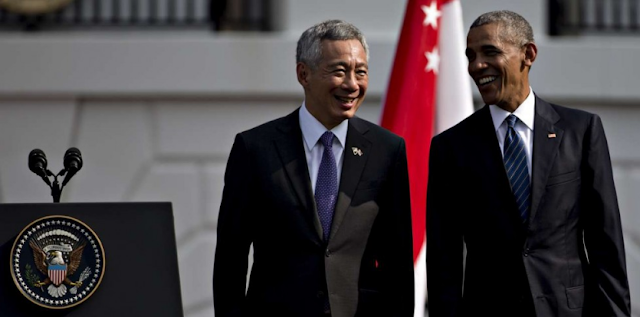The South China Sea shadow over Beijing’s ties with Singapore
China dismayed by city state’s response to Hague ruling and support for US role in Asia

Uncertainty hangs over ties between China and Singapore in the aftermath of a landmark international tribunal ruling on disputes in the South China Sea.
Even though Singapore was not a claimant in the disputed waters, recent gestures by the city state in relation to the ruling appeared to have dismayed Beijing, observers said.
China and Singapore have had close ties, especially economic ones, over the past few decades, with Singapore becoming a training ground for Chinese officials and often cited by Chinese leaders as an example of how a city should be managed.
But recent remarks by Singaporean Prime Minister Lee Hsien Loong has raised concerns in Beijing on how far the relationship between the two nations can go.
After the Permanent Court of Arbitration in The Hague rejected China’s claims to the South China Sea, Lee said the verdict was a “strong statement” about international law in maritime disputes.
Beijing responded by calling on Singapore to have an “objective and fair position”, given its role as a coordinator of relations between China and the Association of Southeast Asian nations.
Beijing was furious when, backed by the United States, the Philippines lodged the case in 2013. It ignored the ruling.
Shen Shishun, senior researcher at the China Institute of International Studies Asia-Pacific Research Centre, said if Singapore took a similar position as the US, China would see it as “playing around with issues of major principle”.
“China believes Singapore can balance major powers but it should not toy with these issues,” Shen said.“As an Asian nation, Singapore should become closer to China.”
Tensions also surfaced earlier this month when Lee told US President Barack Obama that he hoped the US would continue its active engagement in the region. Obama responded by saying Singapore and the US were “rock-solid partners”.
Global Times, published by People’s Daily, said in an editorial that Lee’s trip in the US made some Chinese “very uncomfortable”, especially when Obama praised Singapore as “an anchor” of US presence in Asia. Previously the “two anchors” referred to Japan and Australia, the US’ two allies in the Asia-Pacific, it said.
Ties with China were not always strained. When late leader Deng Xiaoping visited Singapore in 1978, he was so impressed by the way it was run that he asked the then Singaporean leader Lee Kuan Yew for advice on how China could be prosperous. Lee Kuan Yew said China should open up to the capitalist world, and over the next three decades, China benefited from such market reforms.
The two countries also have strong economic links, with China becoming Singapore’s biggest trade partner and the city state a key component in Beijing’s Maritime Silk Road scheme. Government-to-government projects, such as the Suzhou Industrial Park and Tianjin Eco-city, are also key points of cooperation.
In addition, the Communist Party has sent cadres to study in Singapore over the past two decades, and many of them are now mayors or even provincial leaders back in China. They include Vice-Premier Wang Yang who, as Guangdong Communist Party boss, headed delegations to Singapore to study its social and economic developments, according to Nanfang Daily.
Singapore also hosted the “Wang-Koo summit” in 1992 between semi-official organisations from the mainland and Taiwan, as well as November’s historic meeting between President Xi Jinping and his Taiwanese counterpart Ma Ying-jeou, the first meeting between leaders from the two sides in nearly 70 years.
Oh Ei Sun, a senior fellow with the S Rajaratnam School of International Studies in Singapore, said Singapore took a similar position on the South China Sea disputes as other Southeast Asian nations.
“Most of us see arbitration or adjudication as an ordinary and effective resolution to international disputes by means of law. So we see nothing wrong with an Asean leader voicing these sentiments,” he said.
Du Jifeng, a Southeast Asian affairs expert at the Chinese Academy of Social Sciences, said Beijing may be more alert to Singapore’s role in the US strategic presence in Asia-Pacific, but economic ties between China and Singapore would remain strong.
“Singapore is not a claimant nation [in the South China Sea,” Du said.
“Lee’s comments may not influence the direction taken to solve the South China Sea disputes between China and the Philippines.”
(Source : scmp.com)



Post A Comment
No comments :